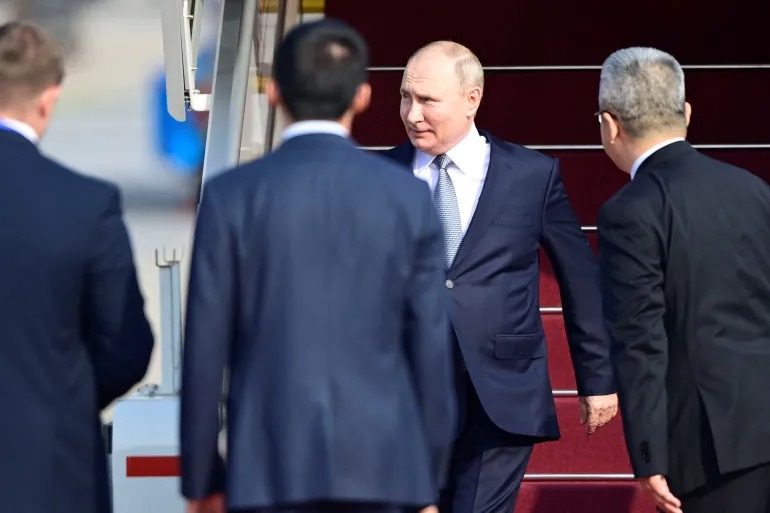Russian President Vladimir Putin has landed in Beijing for a significant meeting with his Chinese counterpart, President Xi Jinping, as they prepare to join leaders from 130 countries at China’s third Belt and Road Initiative forum. While the global focus is intended to be on international projects and economic collaboration, pressing global issues, including the Israel-Hamas conflict and Russia’s ongoing invasion of Ukraine, are casting their shadows over the gathering.
Russia and China’s Belt and Road Ambitions
As China plays host to leaders from across the globe for the Belt and Road Initiative forum, President Xi warmly welcomed his “dear friend” Putin. This forum, a showcase for Xi’s signature international project, will delve into an array of economic and infrastructure initiatives that aim to strengthen connectivity between nations. Yet, beneath the grand plans of the Belt and Road Initiative, contentious issues are at play.
The ICC Arrest Warrant and Putin’s Shelter in China
Putin’s visit to China is particularly noteworthy as it marks one of the few nations the Russian leader has visited since the International Criminal Court (ICC) issued an arrest warrant against him in March. The warrant accuses Putin of illegally deporting children from Ukraine, an issue that underscores the ongoing crisis in Ukraine. However, China’s lack of ICC membership offers Putin a degree of legal shelter, as it is not obligated to transfer him to The Hague for trial.
In this context, Putin’s earlier visit to Kyrgyzstan should be noted, even though China is the first non-former Soviet republic country he has visited this year. Kyrgyzstan is also not an ICC member. Beijing has consistently shrugged off Western criticism of its partnership with Moscow, firmly stating that their close relations do not infringe upon international norms. China remains adamant in asserting its right to collaborate with any country it chooses.
Sino-Russian Ties Deepen Amidst Ukraine Conflict
A notable consequence of the Russia-Ukraine conflict is the strengthening of trade and diplomatic ties between neighboring Russia and China. The two nations have witnessed a surge in trade, particularly in Russian oil exports to China, following international sanctions against Russian imports. In an interview with China’s state broadcaster CGTN ahead of his visit, Putin commented on the emergence of a “multipolar world” and expressed the significance of President Xi’s initiatives in shaping this new global order.
Russia’s Foreign Minister Sergey Lavrov’s arrival in Beijing, before Putin, underscores the significance of this meeting. Lavrov engaged in discussions with China’s Foreign Minister Wang Yi on Monday, preparing the groundwork for the high-profile encounter between Putin and Xi. The two leaders last met in Russia in March, where they jointly acknowledged the extraordinary global changes underway, largely led by their nations.
Putin’s previous visit to China in February 2022 during the Beijing Winter Olympics marked a significant turning point. During that visit, Russia and China released a comprehensive statement reaffirming their unbounded relationship, shortly before Putin’s order to deploy tens of thousands of troops into Ukraine.
This is Putin’s third appearance at the Belt and Road forum, having attended in 2017 and 2019. Moreover, the Russian president has accepted an invitation from North Korean leader Kim Jong Un for a visit to North Korea, following their meeting in Russia last month. Russia’s foreign ministry has confirmed that Sergey Lavrov will make a trip to Pyongyang after concluding his visit to Beijing.
The meeting between Putin and Xi holds the potential to shape the course of global geopolitics and international alliances in the face of several significant and ongoing crises. While the Belt and Road Initiative serves as a platform for multilateral collaboration, it is impossible to ignore the far-reaching implications of these leaders’ discussions against the backdrop of a world grappling with complex challenges.















